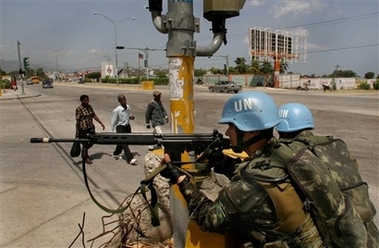 -Church vs. government:
-Church vs. government: -Insightful look at the Border Patrol Explorer Scouts which “exposes teens…to a career with the Border Patrol”. (via Metafilter).
-Aside from signing a major arms deal, Hugo Chavez’s visit this week to
-“Have the Mercosur countries all gone bananas” after last week’s summit? According to Álvaro Vargas Llosa the answer is a resounding “yes”.
-
-The unemployment rate in  ate fell to10.4%.
ate fell to10.4%.
-Jamaican sprinter Asafa Powell (right image) stretched his unbeaten streak in the 100 meter dash to 11 races this year with his latest victory coming at a meet in
-“American women traveling south of the border, whether to the Caribbean, Mexico, or other Latin American countries, should prepare themselves for…cat-calling, groping, and staring”. Oh really?!
-Trade representatives from the
-Lastly, Latin American nations had mixed results on the “World Map of Happiness” though














